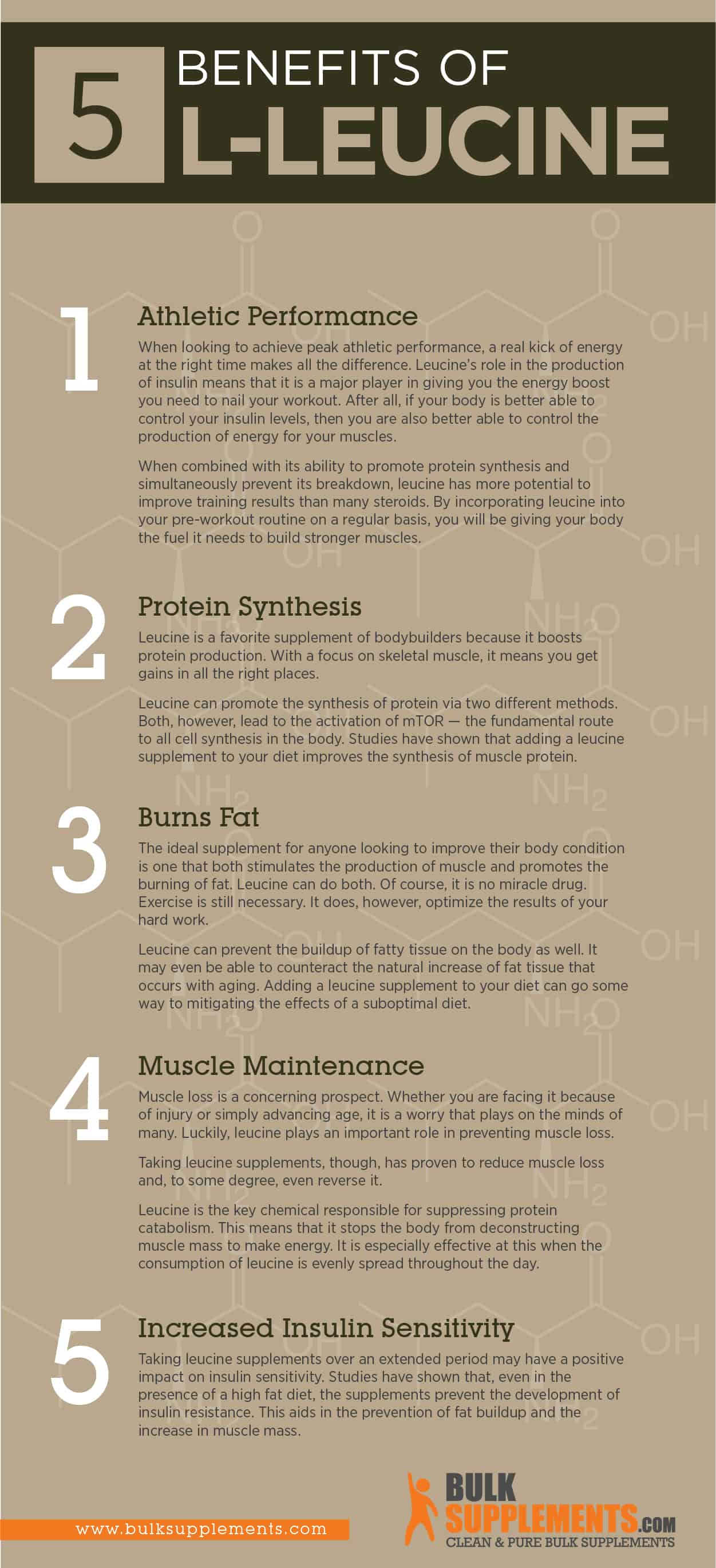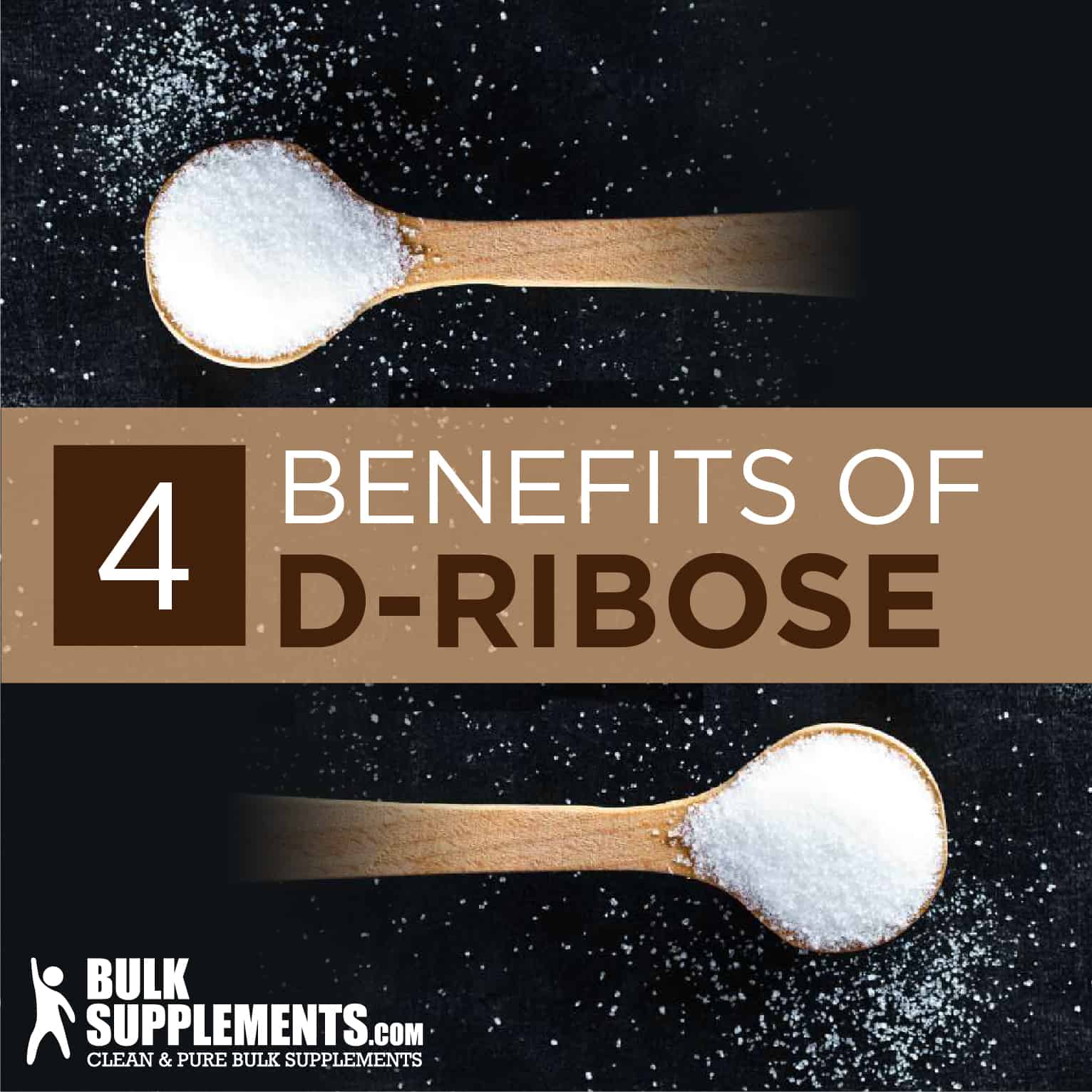L-Leucine: Benefits, Side Effects & Dosage

L-leucine
What is L-Leucine
If you’re not familiar with L-leucine, then you are not alone. It may not be a household name outside of the bodybuilding community, but this essential amino acid is key to supporting human life. It is also considered the primary BCAA (Branched Chain Amino Acid).
L-leucine plays a variety of roles and is present in practically every cell in the body. It is a key component of mitochondria, the energy regulators of the body, and is involved with the regulation of blood sugar and energy levels. It is also crucial for growing and repairing bones and muscles. Moreover, it’s vital for the healing of wounds while being a key ingredient in the production of growth hormones.
Deficiencies of this essential amino acid can lead to symptoms associated with hypoglycemia. Namely fatigue, dizziness and headaches. Leucine is present in all foods containing protein, so for the average person with a healthy diet, sufficient levels can be maintained from food sources alone. Foods high in leucine include whey protein, soy protein, soybeans, beef, peanuts and fish. For vegetarians and vegans, however, leucine deficiency is a real possibility.
L-Leucine Benefits
Athletic Performance
When looking to achieve peak athletic performance, a real kick of energy at the right time makes all the difference. Leucine’s role in the production of insulin means that it is a major player in giving you the energy boost you need to nail your workout. After all, if your body is better able to control your insulin levels, then you are also better able to control the production of energy for your muscles.
When combined with its ability to promote protein synthesis and simultaneously prevent its breakdown, leucine has more potential to improve training results than many steroids. By incorporating leucine into your pre-workout routine on a regular basis, you will be giving your body the fuel it needs to build stronger muscles.
Leucine can directly improve strength. When combined with a resistance exercise program, daily leucine supplements lead to enhanced gains. This makes leucine an ideal bodybuilding supplement.
Protein Synthesis
Leucine is a favorite supplement of bodybuilders because it boosts protein production. With a focus on skeletal muscle, it means you get gains in all the right places.
Leucine can promote the synthesis of protein via two different methods. Both, however, lead to the activation of mTOR — the fundamental route to all cell synthesis in the body. Studies have shown that adding a leucine supplement to your diet improves the synthesis of muscle protein.
Leucine is most effective at promoting protein synthesis when coupled with resistance exercises. Taking leucine post workout is effective in increasing the effects of resistance training. However, it is best to take leucine as a pre-workout supplement for maximum benefits.
Leucine’s effects on muscles focus on the production of skeletal protein. This means that the additional protein is produced as muscle mass. Good news if you are a bodybuilder.
Burns Fat
The ideal supplement for anyone looking to improve their body condition is one that both stimulates the production of muscle and promotes the burning of fat. Leucine can do both. Of course, it is no miracle drug. Exercise is still necessary. It does, however, optimize the results of your hard work.
Leucine can prevent the buildup of fatty tissue on the body as well. It may even be able to counteract the natural increase of fat tissue that occurs with aging. Adding a leucine supplement to your diet can go a long way to mitigating the effects of a sub-optimal diet.
Muscle Maintenance
Muscle loss is a concerning prospect. Whether you are facing it because of injury or simply advancing age, it is a worry that plays on the minds of many. Luckily, leucine plays an important role in preventing muscle loss.
Taking leucine supplements, though, has proven to reduce muscle loss and, to some degree, even reverse it.
Leucine is the key chemical responsible for suppressing protein catabolism. This means that it stops the body from deconstructing muscle mass to make energy. It is especially effective at this when the consumption of leucine is evenly spread throughout the day.
Increased Insulin Sensitivity
Taking leucine supplements over an extended period may have a positive impact on insulin sensitivity. Studies have shown that, even in the presence of a high fat diet, the supplements prevent the development of insulin resistance. This aids in the prevention of fat buildup and the increase in muscle mass.
Other Benefits
BCAA has been studied as a group of supplements for some time, with many benefits becoming more clear. More recently, studies into taking leucine in isolation have increased. With this growth in interest from the scientific community, it is likely that there will be many more hidden benefits of leucine being uncovered.
Current clinical trials are investigating the positive effects of leucine in treating a wide range of conditions, including sarcopenia, type 2 diabetes, and even depression.
The addition of leucine supplements to your diet also has the potential to reduce the levels of “bad” cholesterol in your body. This effect is due to its interactions with fats.

L-Leucine Side Effects
L-leucine is safe to supplement with. However, it is best to stick to the recommended dosage and not exceed 500 mg per kg of body weight per day. Above these levels, it can cause increases in the levels of ammonia in the body, which can have a range of adverse effects.
If you have ever been diagnosed with liver or kidney problems, then you should seek your doctor’s advice before taking this supplement.
Nausea
It is possible that excessive quantities of leucine can lead to nausea and, on occasion, vomiting. If you follow the dosage requirements, though, you should not experience this effect.
Indigestion
Very high doses of leucine can cause stomachaches and diarrhea. If you experience these symptoms, you should check that you have taken the correct dose of L-leucine. It may also be worth considering if any other supplements also contain L-leucine (BCAA, for instance).
Contraindications
Because of leucine’s role in the metabolic pathways of the body it can have some unwanted interactions with certain medications. If you are taking any medication for diabetes, high cholesterol or thyroid conditions, it is best to consult your doctor before adding leucine supplements to your diet.
SEE ALSO

D Ribose: Benefits, Dosage, & Side Effects
L-Leucine in BCAA
BCAA, or branched chain amino acids, are a group of three essential amino acids — valine, leucine and isoleucine. All three of these amino acids are heavily involved in the control of muscle development and regulation of energy levels. All three can be found in good supply in dietary proteins.
Ingesting these amino acids purely via foods takes time. Proteins take several hours to digest, so it takes a long time after a meal for the BCAAs to enter your bloodstream. Taking these amino acids as a free form supplement, either a combined BCAA or individual leucine powder, accelerates the process. This makes it easier to time your intake for maximum effect.
In most BCAA supplements, the ratio of leucine vs. isoleucine vs. valine, is 2:1:1. There is still some scientific debate about whether this is the ideal ratio. It is clearly understood that higher levels of leucine are required. Research is continuing into what the ideal ratio is. It has been proposed that the ratio may vary depending on your sport.
If you want to boost your performance, it is best to include all three BCAAs in your routine. However, if you wish to take them as individual supplements or all together is a matter of personal preference.
Taking them separately allows you to tailor the ratios and alter the time of uptake. Studies have shown that taking leucine pre-workout has benefits to muscle gain, while taking valine and isoleucine post workout reduces DOMS (delayed onset muscle soreness).
Taking a combined BCAA supplement can improve the endurance of athletes. This is because it competes in the brain with tryptophan. Having higher levels of BCAAs therefore reduces the uptake of tryptophan which reduced the signaling of fatigue. The result is that you can train harder and longer.
Dosage and Instructions
For best results, it is suggested that you take two 2,500 mg servings per day. These can be dissolved in water or added to a protein shake.
Spreading the doses throughout the day will allow you to reap the maximum benefits in terms of muscle maintenance. Taking one dose one or two hours prior to a workout will give you the largest boost in muscle production.
It is advisable to take valine and isoleucine along with your leucine supplement. This will allow you to maintain the correct balance of these amino acids.
Why Take L-Leucine?
Leucine has broad beneficial effects that are consistent over a diverse range of people. It is an essential amino acid, and the most important of the branched chain amino acids. Taking L-leucine supplements can boost your muscle production and strength. Taken 1-2 hours prior to a workout, it can boost the impact of your hard work. If you suffer an injury and must rest for a while, taking leucine can reduce muscle loss. It will also help to speed the recovery of your muscle tissues.
The Bottom Line
L-leucine is an essential amino acid and is the powerhouse of the BCAAs. It has a clear role in the production and maintenance of skeletal muscle mass. It has a key role in the production of insulin, which means it controls energy levels and fat buildup. Whether taken as a separate supplement or in a combination, there are many positive effects. If you are not taking any medications, it is safe to take and very hard to overdose on. L-leucine provides an effective way to maximize the gains of every workout.



